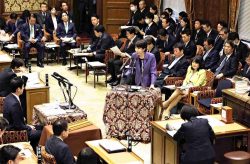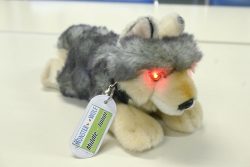14:40 JST, October 17, 2021
The development of small electric aircraft that can carry several passengers is underway in some countries as the next generation of transportation in the sky. The government needs to establish rules for the practical use of such aircraft while giving top priority to flight safety.
These new small electric aircraft are also called “flying cars,” but they will not travel on roads. Like drones, they will take off and land vertically with multiple propellers powered by electricity. They are designed to fly at relatively low altitudes, even several hundred meters.
They are quieter than helicopters and can take off and land in narrow spaces. They are useful for transporting doctors and supplies to disaster sites where roads are cut off, and for transporting patients from remote islands. They are also being considered for use in urban areas where traffic congestion is intense, for tourism and business purposes.
Competition to develop such vehicles is underway in Europe, the United States and China, and they are expected to be commercialized in two to three years. In Japan as well, development work is being conducted at a start-up established by former employees of a major automobile manufacturer and others.
If mass production is launched, Japan’s strength in manufacturing can be utilized, and it is expected to have a ripple effect on the parts and other related industries.
The government also intends to support such development — it will establish rules for the use of flying cars between remote islands by 2023, and create a road map to realize commercialization of its passenger transportation by 2025. Flights are planned between the man-made island venue of the Osaka-Kansai Expo 2025 and the Kansai and Kobe airports.
It is understandable that the government aims to create, through its specification of distinct goals, an environment that will make it easier for companies to invest.
However, as long as such vehicles will be flying in the air, an accident could have serious consequences for human life. Safety must be ensured at the same level as that of conventional aircraft.
These aircraft should be able to withstand gusts and continue flying even if their battery runs out or equipment malfunctions. It will be essential to establish strict standards for screening such safety features.
In the future, the aim is to operate these aircraft automatically without a pilot, using location data and other information, but for the time being, they will rely on a pilot to operate them. Rules to certify the pilot’s skills are also needed to prevent errors in judgment and operation.
The safety of general aviation is ensured by strict monitoring by air traffic control. A complete framework to prevent accidents through the sharing of flight information must be established for small electric aircraft as well.
In urban areas, it is important to secure safe flight routes and takeoff and landing sites. It is also essential to prevent harm to residents caused by such incidents as falling parts.
The government says it will conduct repeated verification tests for the transportation of cargo on remote islands and in mountainous areas, to identify issues related to technology and operation. It is necessary to make every effort to dispel the public’s concerns before putting such aircraft into practical use.
Top Articles in Editorial & Columns
-

Riku-Ryu Pair Wins Gold Medal: Their Strong Bond Leads to Major Comeback Victory
-

Reciprocal Tariffs Ruled Illegal: Judiciary Would Not Tolerate President’s High-Handed Approach
-

China Provoked Takaichi into Risky Move of Dissolving House of Representatives, But It’s a Gamble She Just Might Win
-

Japan’s Plan for Investment in U.S.: Aim for Mutual Development by Ensuring Profitability
-

Flu Cases Surging Again: Infection Can Also Be Prevented by Humidifying Indoor Spaces
JN ACCESS RANKING
-

Producer Behind Pop Group XG Arrested for Cocaine Possession
-

Japan PM Takaichi’s Cabinet Resigns en Masse
-

Man Infected with Measles Reportedly Dined at Restaurant in Tokyo Station
-

Israeli Ambassador to Japan Speaks about Japan’s Role in the Reconstruction of Gaza
-

Videos Plagiarized, Reposted with False Subtitles Claiming ‘Ryukyu Belongs to China’; Anti-China False Information Also Posted in Japan






















